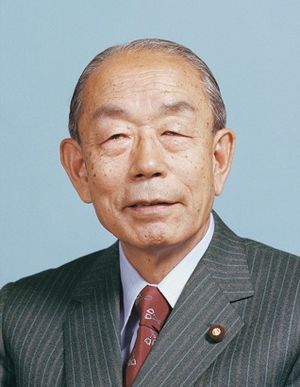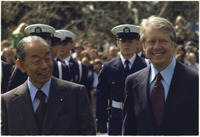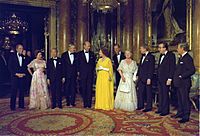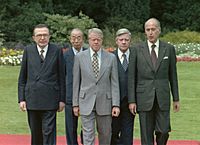Takeo Fukuda facts for kids
Quick facts for kids
Takeo Fukuda
|
|
|---|---|
|
福田 赳夫
|
|
 |
|
| Prime Minister of Japan | |
| In office 24 December 1976 – 7 December 1978 |
|
| Monarch | Shōwa |
| Preceded by | Takeo Miki |
| Succeeded by | Masayoshi Ōhira |
| Member of the House of Representatives for Gunma 3rd District |
|
| In office 1 October 1952 – 18 February 1990 |
|
| Succeeded by | Yasuo Fukuda |
| Personal details | |
| Born | 14 January 1905 Takasaki, Gunma, Empire of Japan |
| Died | 5 July 1995 (aged 90) Tokyo, Japan |
| Political party | Liberal Democratic Party |
| Spouse | Mie Fukuda |
| Children | 5 (inc. Yasuo) |
| Alma mater | Tokyo Imperial University |
| Signature |  |
Takeo Fukuda (福田 赳夫, Fukuda Takeo, 14 January 1905 – 5 July 1995) was an important Japanese politician. He served as the Prime Minister of Japan from 1976 to 1978. Interestingly, his oldest son, Yasuo Fukuda, also became Prime Minister later on.
Contents
Early Life and Education
Takeo Fukuda was born on January 14, 1905, in a village called Kaneko, which is now part of Takasaki City in Gunma Prefecture. His family had a history of being samurai, who were ancient Japanese warriors. His father was even the mayor of Gunma. Fukuda studied law and earned a degree from the University of Tokyo.
Political Career
Starting in Government
Before and during World War II, Fukuda worked as a high-ranking official in the Finance Ministry. He also served as the Chief Cabinet Secretary, a key role in the government. After the war, he continued to work in finance, leading Japan's banking and budget departments.
Becoming a Politician
In 1952, Fukuda was elected to the House of Representatives, which is part of Japan's parliament. He represented the third district of Gunma. A powerful politician named Nobusuke Kishi was his mentor. With Kishi's help, Fukuda became a party secretary in 1957. He also served as the Minister of Agriculture, Forestry, and Fisheries from 1959 to 1960.
Rising Through the Ranks
After Kishi stepped down as Prime Minister, Fukuda continued to be an important figure. He held major positions like Minister of Finance (from 1965-1966 and 1968-1971) and Minister of Foreign Affairs (from 1971-1972). Even when the government faced challenges, Fukuda was seen as a trustworthy leader. He also served as the Director of the Economic Planning Agency from 1974 to 1976.
Becoming Prime Minister
In 1976, after his party did not perform well in an election, the previous Prime Minister resigned. Takeo Fukuda was then chosen to take his place. He served as Prime Minister until 1978.
During his time as Prime Minister, Fukuda faced a difficult situation when a plane was hijacked. He made a famous decision to prioritize human lives, saying, "The value of a human life outweighs the Earth." This meant he was willing to meet the hijackers' demands to save the passengers.

Japan's International Relations
Fukuda worked on improving Japan's relationships with other countries. He helped negotiate a peace treaty with China, which was important for trade and friendship between the two nations. This treaty, called the Treaty of Peace and Friendship between Japan and China, was signed after much discussion.
He also gave a famous speech in the Philippines in 1977, known as the "Fukuda Doctrine." In this speech, he promised that Japan would be a peaceful country and would work closely with countries in Southeast Asia. He wanted to build trust and friendship, offering help and support to these nations.
End of His Time as Prime Minister
To make his political party more fair, Fukuda introduced a new way of choosing leaders through primary elections. However, in the first primary election in 1978, he lost to Masayoshi Ōhira. Because of this, Fukuda had to resign as Prime Minister. He continued to be involved in international groups and retired from politics in 1990.
Personal Life
Takeo Fukuda was married and had five children: three sons and two daughters. His eldest son, Yasuo Fukuda, followed in his footsteps and became Prime Minister in 2007. This made them the first father and son in Japan to both hold the top leadership role. Another important politician, Junichiro Koizumi, started his career working for Fukuda, and they remained close friends.

Death
Takeo Fukuda passed away on July 5, 1995, in a Tokyo hospital. He was 90 years old.
Honours
- Grand Cordon of the Order of the Chrysanthemum (July 5, 1995; given after his death)
- Golden Pheasant Award of the Scout Association of Japan (1979)
See also
 In Spanish: Takeo Fukuda para niños
In Spanish: Takeo Fukuda para niños
 | Aaron Henry |
 | T. R. M. Howard |
 | Jesse Jackson |


